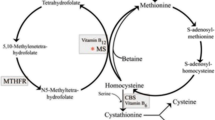Abstract
Metabolic disorders are group of inherited disorders where there is specific enzyme defect leading to various physical and physiological manifestations. These manifestations could vary from subtle defects that go unnoticed to life-threatening defects resulting in early abortions. Patients with metabolic defects have very little tolerance to stress, and they could decompensate during perioperative period as it is a stressful event. Few of common metabolic defects and anticipated problems are outlined in Table 13.1
Access provided by Autonomous University of Puebla. Download chapter PDF
Similar content being viewed by others
Keywords
- Subtle Defects
- Erythropoietic Porphyria
- Pompe Disease
- Cervical Spine Assessment
- Intravenous Sodium Benzoate
These keywords were added by machine and not by the authors. This process is experimental and the keywords may be updated as the learning algorithm improves.
Metabolic disorders are group of inherited disorders where there is specific enzyme defect leading to various physical and physiological manifestations. These manifestations could vary from subtle defects that go unnoticed to life-threatening defects resulting in early abortions. Patients with metabolic defects have very little tolerance to stress, and they could decompensate during perioperative period as it is a stressful event. Few of common metabolic defects and anticipated problems are outlined in Table 13.1
The principles of perioperative management of any child with metabolic disease are similar.
13.1 Preoperative Considerations
-
Elective procedures should be discussed in multidisciplinary team consisting of metabolic physician, anaesthetist and intensivist, and individualized plan has to be made for each patient.
-
Preoperative cardiac assessment is essential.
-
Avoid perioperative fasting – start intravenous dextrose as mentioned in Table 13.2.
Table 13.2 Dextrose requirements in children -
Do not skip routine medication – discuss with metabolic consultant.
Anticipate metabolic crisis and be prepared with emergency drugs (intravenous sodium benzoate, phenylbutrate, etc.) and dialysis if needed.
13.2 Intraoperative Considerations
-
Avoid lactate-containing fluids.
-
Continuous bicarbonate infusion helps in compensating acidosis due to stress.
-
Regular blood gas and electrolyte checking helps in adjusting fluids. There is risk of hyperkalaemia with succinylcholine in myopathies.
-
Avoid albumin for colloid infusion in disorders of amino acid metabolism.
13.3 Postoperative Considerations
-
Keep in ICU for recovery.
-
Restart their regular medications through NG at the earliest.
-
If they are on special feeds, it should be started at earliest.
13.4 Salient Points in Specific Disorders
13.4.1 Glycogen Storage Disease
-
Cardiac assessment in Cori, Anderson and Tauri due to associated cardiomyopathy
-
Respiratory depression due to myopathy, particularly Pompe disease
-
Airway difficulty due to macroglossia in Pompe disease
-
Tight tourniquet could cause muscle lysis in McArdle’s disease
13.4.2 Mucopolyscharidosis
-
Short neck, micrognathia, macroglossia, etc. can make airway management difficult in these patients.
-
Cervical spine assessment has to be carried out carefully as cervical spine instability is common.
-
Might require smaller endotracheal tube, face masks and nasopharyngeal airways and might not fit properly, and it is always better to have backup for emergency tracheostomy.
-
Atlanto-occipital subluxation is common in Morquio syndrome (type 4 MPS).
-
Check for cardiac valve prolapse.
13.4.3 Porphyria
-
Unique intraoperative complication of erythropoietic porphyria is the photoactivation of protoporphyrin by the operating room lights, which can cause tissue burns. Special filters should be used to cover the lights.
Disorders of amino acid metabolism are discussed in detail in individual chapters.
Further Reading
Stuart G, Ahmad N. Perioperative care of children with inherited metabolic disorders. Contin Educ Anaesth Crit Care Pain. 2011;11(2):62–8. https://doi.org/10.1093/bjaceaccp/mkq055.
Author information
Authors and Affiliations
Editor information
Editors and Affiliations
Rights and permissions
Copyright information
© 2019 Springer Nature Singapore Pte Ltd.
About this chapter
Cite this chapter
Vara, R., Shanmugam, N. (2019). Management of Children with Metabolic Disease Undergoing Surgery/Procedure. In: Shanmugam, N., Dhawan, A. (eds) Pediatric Liver Intensive Care. Springer, Singapore. https://doi.org/10.1007/978-981-13-1304-2_13
Download citation
DOI: https://doi.org/10.1007/978-981-13-1304-2_13
Published:
Publisher Name: Springer, Singapore
Print ISBN: 978-981-13-1303-5
Online ISBN: 978-981-13-1304-2
eBook Packages: MedicineMedicine (R0)




